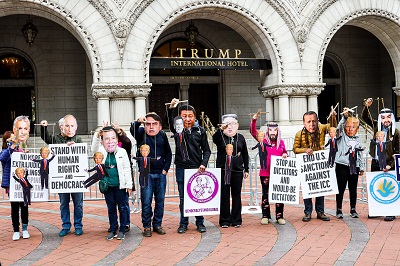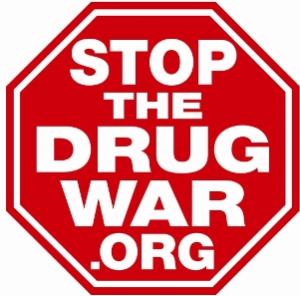A United Nations anti-drug bureaucracy may be about to make some incremental improvements in scheduling cannabis.
Please take action to pass marijuana legalization in the US House of Representatives, being voted on this week!
As 2020 comes to a close, the global fight against the war on drugs does not.
A CDC study finds that marijuana legalization is linked to declining teen marijuana treatment rates, an EU court throws out France's ban on CBD, and more.
Fort Worth, Texas, prosecutors will dismiss minor marijuana charges with one big caveat, Colombia's defense minister says coca eradication is on track, and more.
Connecticut Democrats threaten to let voters have a say on marijuana legalization, Georgia opens applications for cannabis oil producers, and more.
The impact of voters' choices earlier this month is beginning to be felt, a new poll has New Yorkers ready to legalize marijuana, Vancouver's city council votes to move toward drug decriminalization, and more.
Marijuana legalization is on the move in Washington, DC, and Mexico City, Washington state activists push for therapeutic psilocbyin and broader drug decriminalization, British police chiefs call for expanding a heroin maintenance pilot program, and more.
It's now legal to possess and grow your own marijuana in Arizona, the House Rules Committee takes up the MORE Act on Wednesday, Purdue Pharma pleads guilty to three federal criminal charges, and more.
The 53 member states of the Commission on Narcotic Drugs, the UN body charged with supervising the application of the international drug control treaties that form the legal backbone of global drug prohibition, is set to meet in Vienna on December 2-4, and it will take up the question of making some modest scheduling changes to the way cannabis is classified.

Vienna International Centre, home to the Commission on Narcotic Drugs
As explained in an
October briefing paper from the International Drug Policy Consortium and the Transnational Institute, cannabis is currently both a Schedule I and a Schedule IV drug under the international drug treaties. Schedule I includes "substances that are highly addictive and liable to abuse or easily convertible into those (e.g. opium, heroin, cocaine, coca leaf" -- although Bolivia begs to differ on the latter), while Schedule IV includes Schedule I drugs with "particularly dangerous properties and little or no therapeutic value" (e.g. heroin, carfentanil).
With medical marijuana legal in dozens of countries in one form or another, the ever-increasing mountain of evidence supporting the therapeutic uses of cannabis, not to mention outright legalization in 15 American states Canada and Uruguay, with Mexico about to come on board, the harsh scheduling of cannabis is out of touch with both the science and the tide of history. Led by dedicated public health officials in the UN bureaucracies -- with equally dedicated activists monitoring the process and advocating -- the push is underway to revise those schedules.
But this is the United Nations, and change comes at a glacial pace and even then, only incrementally. The Geneva-based World Health Organization (WHO) is charged under the UN drug conventions with assessing the harms and benefits of substances and making scheduling recommendations. For the first time in its history, it assessed cannabis in 2018, through an examination by WHO's Expert Committee on Drug Dependence (ECDD). In January 2019, the WHO formally recommended that cannabis be removed from Schedule IV and that CBD cannabis preparations containing less than 0.2% THC, such as tinctures and extracts, be removed from the schedules altogether.
Now the recommendations are back in Vienna, where the CND after several delays is finally expected to vote on them. As the official discussion at an October intersessional meeting of the CND shows, governments with regressive drug policies have argued that recognizing marijuana's medical benefit could lead to increased abuse of the drug, and some have questioned WHO's scientific analysis.
While civil society groups gave the WHO's recommendations decidedly mixed reviews, including its "very questionable rationale for keeping cannabis in Schedule I," they also applauded its "obvious recommendations deserving support." The removal of cannabis form Schedule IV in particular would signify UN recognition that cannabis really does have therapeutic uses.
Stay tuned. The CND session and possible progress on cannabis liberalization at the international level are just days away.
back to top
Dear reformer:
The US House of Representatives is scheduled to take an historic, first-ever vote on marijuana legalization this week! A hearing before the vote is scheduled for tomorrow morning (Wednesday), so please take action as soon as you can!
The MORE Act (Marijuana Opportunity Reinvestment and Expungement Act of 2019) will remove marijuana from the Controlled Substances Act, decriminalizing it at the federal level and allowing states to move forward with legalization. It will allow marijuana businesses access to banking services. And it will enact social justice measures to help the communities most impacted by the drug war, like expungement of past convictions and equity measures for the legal marijuana industry. Read more about the MORE Act here.
If you're a US voter, please write your member of Congress using our online action alert. When you're done, please call them too -- use the Congressional Switchboard main number, (202) 224-3121, then ask to be transferred.
This historic moment is also a really important one. I hope we can count on your support to get the MORE Act through the House of Representatives now, and then as we take it from there!
Sincerely,

David Borden, Executive Director
StoptheDrugWar.org
Washington, DC
https://stopthedrugwar.org
back to top
Dear supporter:
As 2020 comes to a close, the global fight against the war on drugs does not. Your support can make a monumental difference as we advocate to protect human rights and connect drug policy movement organizers from all over the world. Whether you're pushing for change in Latin or North America, in Middle Eastern or African nations, your support is urgently needed this
Giving Tuesday. Contributions up to $10,000 will be matched - so double your impact and donate today!
Much of the world is moving toward compassionate drug policy this year as legalization and decriminalization campaigns find success, but human rights and democracy are still at risk. We need your support to fund our work on marijuana and other drug policy at the UN; our Stand with Human Rights and Democracy campaign in partnership with Filipino advocates responding to President Duterte’s drug war killings and President Trump’s support for Duterte; and to continue the Drug War Chronicle newsletter, a critical resource for all drug policy reform issues in the US and abroad.
After a week of eating and online shopping, Giving Tuesday kicks off December with a focus on helping others. Click here to make a tax-deductible donation to our educational activities, or click here to make a non-deductible contribution for our lobbying work.
In a year where help is critically needed, we hope you can give to our cause of fighting for an end to drug war injustice. Thank you!

Photo above: On October 27, 2020, we organized “Autocrat Fair,” an event in Washington, DC launching the Stand for Human Rights and Democracy campaign. Autocrat Fair was co-organized with Movement for a Free Philippines, a group concerned with President Rodrigo Duterte's extrajudicial drug war killings. One of the signs highlighted the 30,000 drug war killings that human rights groups believe the government has perpetrated so far.
Linking Duterte's abuses to larger world problems, demonstrators held signs and wore masks representing ten autocratic world leaders, eight of them holding and pulling the strings of Trump marionettes. Autocrats represented in this photo, from left to right, include Victor Orban of Hungary, Vladimir Putin of Russia, Rodrigo Duterte of the Philippines, Jair Bolsonaro of Brazil, Kim Jong-un of North Korea, Mohammed bin Salman of Saudi Arabia, Recep Tayyip Erdo?an of Turkey, Donald Trump of the United States and Mohammed bin Zayed of Abu Dhabi.
Sincerely,

David Borden, Executive Director
StoptheDrugWar.org
P.O. Box 9853, Washington, DC 20016
https://stopthedrugwar.org
back to top
A CDC study finds that marijuana legalization is linked to declining teen marijuana treatment rates, an EU court throws out France's ban on CBD, and more.

Mexico is poised to become the world's largest legal marijuana market.
Teen Marijuana Treatment Admissions Fell Sharply in States That Legalized, Federal Report Shows. A peer-reviewed research report released last Thursday by the Centers for Disease Control and Prevention (CDC) finds steep declines in teens sent to drug treatment for marijuana use in states that have legalized it. But medical marijuana legalization appeared to have no impact on teen drug treatment admissions for marijuana use. "Consistent with prior research on medical marijuana and adolescent marijuana use, medical legalization status does not appear to correspond to treatment admission trends," the study says. "Notably, however, 7 of 8 states with recreational legalization during the study period fall into the class with the steepest level of admissions decline."
South Dakota Sore Loser Cops File Suit to Overturn Marijuana Legalization. Pennington County (Rapid City) Sheriff Kevin Thom and state Highway Patrol Superintendent Rick Miller have filed a lawsuit seeking to void the state's voter-approved recreational marijuana constitutional amendment. The lawsuit filed last Friday argues that the measure should be considered a revision of the constitution, not an amendment, and that it violates the state constitution by addressing multiple topics. South Dakotans for Better Marijuana Laws, the group behind the initiative, says it is confident it will be upheld.
International
Australia Study Finds Strong Support for Pill Testing. A long-running election study by the Australian National University finds that nearly two-thirds of the public support the harm reduction tactic of pill testing at music festivals. Some 63% favored the idea even though governments across the country have largely refused to implement it despite high-profile drug-related deaths at those festivals.
European Union Court Rules French Ban on CBD Is Illegal. The European Union's Court of Justice ruled last Thursday that France's ban on CBD products is invalid. CBD doesn't qualify as a narcotic drug because "it does not appear to have any psychotropic effect or any harmful effect on human health," the court held. Under French law, only hemp seeds and fiber -- not the flower containing CBD -- are legal. France's law violated EU law on the free movement of goods, and the French need to modify their hemp law, the court said. "The national court must assess available scientific data in order to make sure that the real risk to public health alleged does not appear to be based on purely hypothetical considerations," the court wrote. "A decision to prohibit the marketing of CBD, which indeed constitutes the most restrictive obstacle to trade in products lawfully manufactured and marketed in other [EU] member states, can be adopted only if that risk appears sufficiently established."
Mexican Senate Approves Marijuana Legalization Bill. The Senate voted overwhelmingly last Thursday to approve a marijuana legalization bill. The bill passed 82-18, with seven members not voting. The congress is under pressure from the national Supreme Court to get legalization done before the end of next month, and the measure now heads to the Chamber of Deputies, where it is also expected to pass. Final passage of the bill would make Mexico the world's largest legal marijuana market.
back to top
Fort Worth, Texas, prosecutors will dismiss minor marijuana charges with one big caveat, Colombia's defense minister says coca eradication is on track, and more.

Colombian coca field (DEA Museum)
Fort Worth to Dismiss Small Time Pot Cases -- If People Pass Three Drug Tests in Three Months. The Tarrant County (Fort Worth) Criminal District Attorney's Office has announced it will dismiss minor marijuana possession cases, but only if the defendant passes three drug tests in three months. Possession of less than two ounces of marijuana is the most common criminal charge in the county. "One of the goals of the criminal justice system is rehabilitation; sobriety is the beginning of that rehabilitation, "Tarrant County Criminal DA Sharen Wilson said. "When you bring proof of three months of sobriety -- 90 days -- the charge will be dismissed."
San Francisco Bid to Ban Smoking, Including Marijuana, in Apartment Buildings Draws Opposition. City Board of Supervisors President Norman Yee has introduced a measure that would bar people from smoking or vaping tobacco and marijuana in their apartments. The measure would apply to buildings with at least three units. But the move is drawing opposition from progressive LGBTQ groups and medical and recreational marijuana advocates. Yee's plan allows for medical marijuana, but that isn't soothing advocates. A vote before the full board is set for December 1.
International
Colombian Defense Minister Says County Will Meet 2020 Coca Eradication Target. Defense Minister Carlos Holmes Trujillo said Monday that the country will meet its 2020 coca eradication target. The government had set a target of 320,000 acres eradicated and has so far eradicated about 300,000 acres. That's an increase of 30% over last year. The program includes aerial eradication operations involving the probably poisonous substance herbicide glyphosate, and is unlikely to make more than a short-term dent in cultivation.
Mass Grave With At Least 113 Bodies Found in Mexico's Jalisco State. A mass grave in Jalisco state that was discovered on October 2 has now yielded at least 113 bodies. Jalisco is one of the most violent drug cartel battlegrounds in the country and is the home of the most bodies found in clandestine mass graves since 2006, according to a recent government report.
back to top
Connecticut Democrats threaten to let voters have a say on marijuana legalization, Georgia opens applications for cannabis oil producers, and more.

Minneapolis enacts minor changes to its policy on no-knock raids, but activists say it isn't nearly enough. (Creative Commons)
Connecticut Democrats Will Put Marijuana Legalization Before the Voters if Legislature Fails to Pass Bill. Incoming House Speaker Matt Ritter (D) said Tuesday that if the legislature failed again to legalize marijuana, Democrats will do an end run and let the voters decide the issue via a ballot referendum. "I think it'll be a very, very close vote in the House," Ritter said. "But if we do not have the votes -- and I'm not raising the white flag -- I want to be very clear: We will put something on the board to put to the voters of the state of Connecticut to amend the state constitution to legalize marijuana." That, however, could take until 2022 and possibly even 2024.
Detroit City Council Passes Recreational Marijuana Sales Ordinance. Ending its refusal to allow anything other than medical marijuana sales in the city, the Detroit city council on Tuesday voted unanimously to approve an ordinance allowing adult-use sales. The measure weights licensing preferences to favor longstanding city residents. Those "legacy Detroiters" will be eligible for half of the 75 licenses the city is proposing.
Medical Marijuana
Georgia Opens Applications for Medical Marijuana Producers. Businesses that want to produce cannabis oil for medical use can now apply for state licenses. That's because the Georgia Access to Medical Cannabis Commission has finally given the go-ahead. Applications are available on the group's website and must be in by December 28.
Law Enforcement
Minneapolis Announces Small Reforms to No-Knock Warrant Policy. Mayor Jacob Frey and Police Chief Medaria Arradondo have announced changes to the city's policy on no-knock raids, but the changes aren't enough for local activists. Under the policy shift, no-knock raids are not ended, but police officers will instead have to announce their presence as they enter premises -- and keep doing so periodically while they are inside. The move comes in the wake of unrest after the death of George Floyd at the hands of Minneapolis police. "This is about proactive policymaking and instilling accountability," Frey said. "We can't prevent every tragedy, but we can limit the likelihood of bad outcomes. This new, no-knock warrant policy will set shared expectations for our community and clear and objective standards within the department." Michelle Gross is president of Communities Against Police Brutality. The move was "pretty disappointing," she said. "Nothing about this would decrease the number of no-knock warrants," she said. "It simply enhances, to a certain degree, the announcement as officers move from room to room. But I don't see this as being a big advance, I really don't."
back to top
The impact of voters' choices earlier this month is beginning to be felt, a new poll has New Yorkers ready to legalize marijuana, Vancouver's city council votes to move toward drug decriminalization, and more.

Drug decriminalization begins to take hold in Oregon, so we're going to be seeing less of this. (Creative Commons)
New Jersey Attorney General Orders End to Marijuana Possession Prosecutions. In a Wednesday letter to city, county, and state prosecutors, Attorney General Gurbir Grewal ordered them to put a halt to small-time marijuana possession prosecutions until at least January 25. "It simply does not make sense or serve justice to proceed with prosecutions on charges that may be foreclosed soon through legislative action," Grewal said in a statement. "Fairness demands that we suspend prosecution of marijuana possession-related cases while we await direction from the Legislature.".
New York Poll Has Support for Marijuana Legalization at All-Time High. A Sienna College poll released Tuesday has support for legalizing marijuana at an all-time high, with 60% saying it is time to free the weed. That's up five points from the same poll in February, when 55% supported it. Meanwhile, the number of people who opposed it dropped from 40% in February to 32% now.
Medical Marijuana
New Jersey Court Rules State Must Change "Unreasonable" System to Decide Who Can Sell Medical Marijuana. A three-judge appellate court ruled Wednesday that the state's system for determining who get can medical marijuana dispensary licenses was not transparent, created confusion in the industry, and was "unreasonable." The court threw out a 2018 decision awarding six licenses and ordered the health department to come up with a better rating system.
Drug Policy
Oregon County to End Low-Level Drug Possession Prosecutions. Prosecutors in Clackamas County, just outside Portland, sent a letter to local police chiefs Monday telling them that while they disagreed with voters' decision to decriminalize drug possession earlier this month, they will heed their wishes and drop drug possession cases. "Having officers investigate and submit cases for a prosecution in the weeks leading up to February 1, which will not lead to any sanction or court supervised treatment, is not the most effective use of criminal justice resources," the prosecutor's office said.
International
Canadian Government Gives Formal Response to Petition to Decriminalize Psychedelics. Responding to a petition presented to parliament signed by more than 15,000 Canadians calling for the decriminalization of psychedelics, government ministers formally replied that no such move would take place until psychedelics underwent further study. The ministers also pointed to ways some people could obtain exemptions to use them legally despite federal prohibition.
Vancouver City Council Unanimously Approves Motion to Seek Decriminalization of Drug Possession. The Vancouver city council voted unanimously Wednesday to approve a motion asking the federal government to let it decriminalize simple drug possession. The motion was spearheaded by Mayor Kennedy Stewart, who cited high drug overdose death numbers. "On the same day that the B.C. Coroners Service confirmed that a person a day continues to die in our city due to drug overdose, Vancouver has once again decided to lead the way on drug policy in order to save lives," Stewart said. "If approved by the federal government, we will begin a robust process to determine how decriminalization will be implemented in Vancouver."
back to top
Marijuana legalization is on the move in Washington, DC, and Mexico City, Washington state activists push for therapeutic psilocbyin and broader drug decriminalization, British police chiefs call for expanding a heroin maintenance pilot program, and more.

Marijuana legalization has passed the Mexican Senate, and the Chamber of Deputies should soon follow suit. (Creative Commons)
House to Vote on Marijuana Legalization Bill This Week. House Majority Leader Stony Hoyer (D-MD) said late last week that a marijuana legalization bill, the MORE ACT (HR 3884) would receive a House floor vote this week. First, though, it will go before the House Rules Committee. A floor vote should come between Wednesday and Friday.
Drug Policy
Washington State to See Push for Psychedelics, Drug Decriminalization. In the wake of victories for therapeutic psilocybin and drug decriminalization in Oregon this year, drug reformers in neighboring Washington are now looking to push similar reforms there. One push is for therapeutic psilocybin for end-of-life patients using existing administrative mechanism, while a second is aiming at a statewide drug decriminalization initiative that also legalizes psilocybin for broader therapeutic purposes. Meanwhile, advocates plan on lobbying the legislature for drug decriminalization this year, too.
International
British Police Chiefs Call for Expansion of Heroin-Assisted Treatment Program. The National Police Chiefs Council is calling for heroin-assisted treatment to be rolled out "across the country" after a year-old pilot program reported "very promising" results. Jason Harwin, the drug policy lead for the group, said his colleagues should ponder following that lead. We should look at expanding it across the rest of the country," Harwin. "Not in every place, not everywhere needs it. But where clearly there’s a heroin problem and particularly drug-related deaths and an impact on criminality and organized crime, it’s clearly a solution that actually helps "individuals and the wider communities as well."
Colombia Defense Minister Says Aerial Fumigation of Coca Crops Must Restart. Defense Minister Carlos Holmes Trujillo said last Friday that the country needed to restart spraying coca crops with the herbicide glyphosate in order to shrink cocaine production and shrink the income of illegal. "There is no doubt at all. Colombia needs to reestablish aspersion, aerial fumigation with glyphosate for national security reasons," Holmes Trujillo said. "Logically it needs to be reestablished with assurances for health and the environment." Doing so would cut off resources "for those who commit massacres and kill social leaders," he added.
Mexican Senate Votes to Legalize Marijuana. The Senate overwhelmingly approved a marijuana legalization bill last Thursday. The bill now goes to the Chamber of Deputies where it is also expected to pass. President Andres Manuel Lopez Obrador has not publicly backed the bill, but his ruling MORENA Party, which supports the bill, holds majorities in both chambers. Under the bill, adults could possess up to an ounce and grow up to four plants at home, while a system of taxed and regulated legal sales would also be set up.
back to top
It's now legal to possess and grow your own marijuana in Arizona, the House Rules Committee takes up the MORE Act on Wednesday, Purdue Pharma pleads guilty to three federal criminal charges, and more.
Marijuana PolicyHouse Rules Committee Takes Up Marijuana Legalization Bill Tomorrow Ahead of Looming Floor Vote. The House Rules Committee takes up the MORE Act (HR 3884) tomorrow, paving the way for a House floor vote on the bill later this week. House Judiciary Committee Chairman Jerrold Nadler (D-NY) sent the bill to the Rules Committee with some modifications, the most significant of which revolve around taxation. The bill originally imposed a 5% tax on marijuana products, but Nadler has amended the bill to remove that language and replace it with a scheme that would allow increases in the tax rate until it reaches 8%.
Arizona Marijuana Legalization Now in Effect. Marijuana is now legal in the state. It became so after the state secretary of state certified the election results, affirming that Prop 207 indeed passed. It is now legal to possess up to an ounce of marijuana and up to five grams of concentrates and to grow up to six plants for personal use. The legal, regulated marijuana market won't be in effect until sometime next year.
Virginia Legislative Working Group Issues Report Outlining Path to Legalization. A working group on marijuana legalization requested by the legislature issued its report Monday and concluded that the end of pot prohibition "cannot be created quickly." First, the state needs to invest in data collection, craft new regulations, and undertake a public education campaign, the report said. That pushes legalization down the road: "Setting up an adequate regulatory structure will require a significant up-front investment, in time, patience, and budgetary resources," the report reads. The report sets an 18-24-month timeline for legalization and up to five years before there is a fully developed legal marijuana industry.
Heroin and Prescription Opioids
Purdue Pharma Pleads Guilty to Federal Criminal Charges Over Oxycontin Role in Opioid Crisis. OxyContin maker Purdue Pharma pleaded guilty Tuesday to one count of conspiracy to defraud the United States and violate the Food, Drug, and Cosmetic Act, as well as two counts of conspiracy to violate the Federal Anti-Kickback Statute. The move came after a plea deal agreed to in October that also includes a historic $3.544 billion fine and a $2 billion criminal forfeiture. The company will now be dissolved and its assets used to incorporate a "public benefit company" designed to serve the public, not the company's bottom line.
back to top









